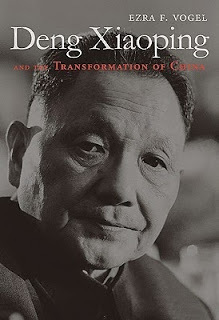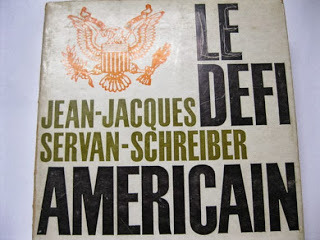Deng Xiaoping and Liberal Democracy
 Reading this large but absorbing tome leaves one with the sense that Vogel wished Deng had brought China closer to liberal democracy, in the same fashion as old school biographers of Gandhi conveyed the chimes of a pious wish that he had become a Christian. Neither eventuality was ever "in the cards." One suspects that many reviewers of Vogel's work are critical also of the author for "going easy" on Deng for the very same reason.
Reading this large but absorbing tome leaves one with the sense that Vogel wished Deng had brought China closer to liberal democracy, in the same fashion as old school biographers of Gandhi conveyed the chimes of a pious wish that he had become a Christian. Neither eventuality was ever "in the cards." One suspects that many reviewers of Vogel's work are critical also of the author for "going easy" on Deng for the very same reason.Though it looms large in current international relations, liberal democracy has very shallow roots. One cannot accuse the British Empire, for instance, of having tried to make the world safe for democracy; it was trying to make it safe for the British pound. Not until well into the twentieth century can liberal democracy be said even to exist. The international megaphone meanwhile has been passed on. As western democracies were/are refining their notions of liberal democracy, dozens of other countries were/are struggling simply to be free, from their past and from their recent colonial overlords. It seems suspicious that these former overlords should require of India, China and the dozens of nations that came into being around the middle of the twentieth century that their politics be conducted as if by Westernized Oriental Gentlemen.
John Locke can be said to have laid the foundation for such a philosophy of political behavior
 or government, but it is useful to remember that he did much of his thinking in the comfort of the palatial residence of the Earl of Shaftesbury whom he served as personal physician. The notion elaborated in the Second Treatise on Government that civil society should have the liberty and legitimacy to overthrow a (royal) government that had grown tyrannical formed the rationale for the Glorious Revolution of 1688. England deposed one king and adopted another with some sort of understanding that the new monarch would get along better with the nobility and landed gentry. Locke would have been horrified to see his ideas pressed into the service of the American revolution as it was (as brilliantly argued by Louis Hartz in 1955) and would probably be spinning in his grave about the Irish being given any kind of democracy. What he would have thought about Margaret Thatcher's successful attempt at re-establishing British liberal democracy in the Falklands (what did she or the world think was going to happen to the Islands under Argentine rule?) and failed attempt to maintain it in Hong Kong, it is best not to speculate.
or government, but it is useful to remember that he did much of his thinking in the comfort of the palatial residence of the Earl of Shaftesbury whom he served as personal physician. The notion elaborated in the Second Treatise on Government that civil society should have the liberty and legitimacy to overthrow a (royal) government that had grown tyrannical formed the rationale for the Glorious Revolution of 1688. England deposed one king and adopted another with some sort of understanding that the new monarch would get along better with the nobility and landed gentry. Locke would have been horrified to see his ideas pressed into the service of the American revolution as it was (as brilliantly argued by Louis Hartz in 1955) and would probably be spinning in his grave about the Irish being given any kind of democracy. What he would have thought about Margaret Thatcher's successful attempt at re-establishing British liberal democracy in the Falklands (what did she or the world think was going to happen to the Islands under Argentine rule?) and failed attempt to maintain it in Hong Kong, it is best not to speculate.But India, China and other nations though new as nations are not so new as cultures or civilizations. They developed not besotted with the belief that "all that is, is right," nor that Progress was "historically inevitable," nor that as such it would lead to liberal democracy. In China, the essence of political legitimacy was to maintain order and prosperity such that even though enough is known about neighboring countries, its own people would have no interest to visit their neighbors. When Deng was confronted with the dramatic escapes from China to Hong Kong, his reaction was not to preach liberal democracy (which might have recommended walls of razor wire) but economic development.
Is this cultural difference tantamount to a "clash of civilizations"? I seriously doubt it. Huntington's essay was occasioned by the work of a former student who wrote The End of History, an explication of Hegel's notion (one Marx approved of) that nation-states would inevitably wither away. If so, what would we ever fight over? From the point of view of an American political scientist in the 1990s, cultural values, of course. Alas, nation-states do not appear to be in any hurry to wither away. Further, conflict arises not discernibly because of cultural differences; it seems more likely to be the case when there is a bully in the schoolyard.
 Ten years before Ayatollah Khomeni referred to the United States as "the Great Satan," pundits were agog with Servan-Schreiber's Le Defi Americain. Perhaps that was simply Gallic nerve. Then came Shintaro Ishihara's The Japan that can say No. He was deemed a ultra-nationalist crank. What do pundits think a poll of European and South American states today would reveal?
Ten years before Ayatollah Khomeni referred to the United States as "the Great Satan," pundits were agog with Servan-Schreiber's Le Defi Americain. Perhaps that was simply Gallic nerve. Then came Shintaro Ishihara's The Japan that can say No. He was deemed a ultra-nationalist crank. What do pundits think a poll of European and South American states today would reveal?We can all hope that the nation-states of the world spare some consideration for economic prosperity whether or not they are also thinking of liberal democracy or worried about the schoolyard bully.
Published on October 02, 2013 18:23
No comments have been added yet.



